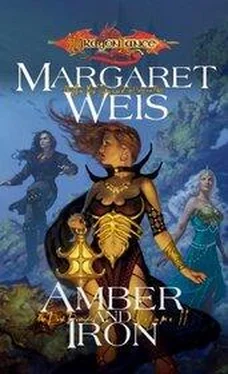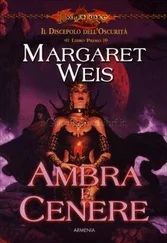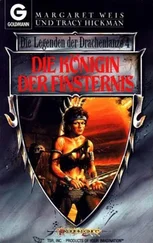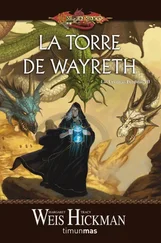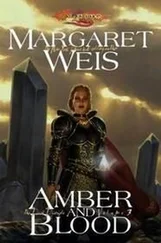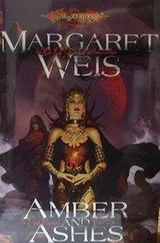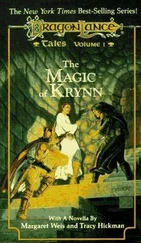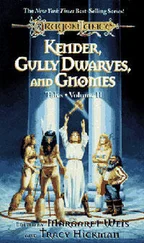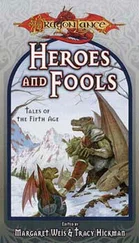Margaret Weis - Amber and Iron
Здесь есть возможность читать онлайн «Margaret Weis - Amber and Iron» весь текст электронной книги совершенно бесплатно (целиком полную версию без сокращений). В некоторых случаях можно слушать аудио, скачать через торрент в формате fb2 и присутствует краткое содержание. Жанр: Фэнтези, на английском языке. Описание произведения, (предисловие) а так же отзывы посетителей доступны на портале библиотеки ЛибКат.
- Название:Amber and Iron
- Автор:
- Жанр:
- Год:неизвестен
- ISBN:нет данных
- Рейтинг книги:4 / 5. Голосов: 1
-
Избранное:Добавить в избранное
- Отзывы:
-
Ваша оценка:
- 80
- 1
- 2
- 3
- 4
- 5
Amber and Iron: краткое содержание, описание и аннотация
Предлагаем к чтению аннотацию, описание, краткое содержание или предисловие (зависит от того, что написал сам автор книги «Amber and Iron»). Если вы не нашли необходимую информацию о книге — напишите в комментариях, мы постараемся отыскать её.
Amber and Iron — читать онлайн бесплатно полную книгу (весь текст) целиком
Ниже представлен текст книги, разбитый по страницам. Система сохранения места последней прочитанной страницы, позволяет с удобством читать онлайн бесплатно книгу «Amber and Iron», без необходимости каждый раз заново искать на чём Вы остановились. Поставьте закладку, и сможете в любой момент перейти на страницу, на которой закончили чтение.
Интервал:
Закладка:
First, people took artifacts that came from the temples of the overtly evil gods—Chemosh and Takhisis, Sargonnas, and Morgion. The temples of the neutral gods were the next to fall victim to the artifact hunters, the claim being made that “any god who is not for us is against us.”
Finally, as religious fervor (and greed) spread, holy warriors raided the temples of the Gods of Light, including those of the goddess of healing, Mishakal, for although she was Paladine’s consort, Mishakal committed the sin of opening her doors of healing to all mortals, even those who were not deemed worthy of a god’s blessing. Her clerics had actually been known to lay healing hands on thieves and prostitutes, kender and dwarves, and even wizards. When the clerics of Majere, god of justice, heard that Mishakal’s priests were being beaten and her artifacts stolen, they sought to protest. Their monasteries were then raided. Their artifacts went next.
Soon, the holy artifacts of every god in the pantheon, with the exception of Paladine, were locked up in what had once been the Tower of High Sorcery of Istar but which was now known as Solio Febalas, the Hall of Sacrilege. It was whispered that Paladine’s priests were starting to grow nervous, and that more than a few had been seen locking up the god’s holy relics in their storerooms. But even they were not safe.
When the Cataclysm struck Istar, the Hall of Sacrilege was destroyed in the fire of the gods’ wrath. The gods were confident the artifacts had been consumed in the conflagration. They wanted mortals to live on their own for a while.
No one had been more surprised to discover the artifacts intact than Nuitari. His single idea had been to claim the Tower for his own. Finding the artifacts had been a bonus. He knew he could not keep a secret as powerful as this forever. It would be only a matter of time before the other gods discovered the truth and came to him, demanding the artifacts back. The artifacts were in a safe place, guarded both by powerful magical spells and by Midori, an ancient and bad-tempered sea dragon. Such safeguards would keep out mortals; they would not stop a god.
Nuitari didn’t have to worry about that.
The gods would stop the gods.
Each god would want his or her own artifacts, of course. Each god would also want to insure that although he got his, no other gods would get theirs.
For example, Mishakal would not want Sargonnas, currently the most powerful God of Darkness, to regain his artifacts. She would seek out allies in her efforts to impede him—unlikely allies, such as Chemosh, who would side with Mishakal in this, for the Lord of Death was locked in a power struggle with Sargonnas and would not want the Horned God growing stronger that he already was. Then there was Gilean, God of the Scales, who might well oppose both the gods of Light and of Darkness, for fear that the return of these artifacts to any of the gods would upset an already teetering balance.
The sacred fur would really fly when the gods found out Nuitari was in possession of artifacts of Takhisis, the dead Queen of Darkness, and those of the self-exiled god, Paladine. Although their creators were gone, the artifacts remained, as did their holy power, which could be immensely useful to any god or mortal who laid hands on them. The squabbling over these alone might well last for centuries.
Meanwhile, Nuitari’s plan was to go about heaven making secret deals, quietly handing over an artifact here and another one there, playing the gods one off the other, all the while strengthening his own position.
Though Nuitari had hated Takhisis and had done his best to oppose her in everything she had ever done, he was like his mother in one regard—he had her dark ambition.
Opposing that ambition were Nuitari’s two cousins, Lunitari and Solinari. The gods of White and Red Magic would not give a bent copper for the holy artifacts. The Kingpriest, not trusting wizards or their magic, had not kept any artifacts belonging to wizards. Those magical objects that were found (and there were few, for the wizards had hidden most away) were immediately destroyed. Nuitari’s cousins would be furious when they heard he had gone off and built his own Tower. They would be furious—and they would be dismayed, grief-stricken. Since the beginning of time, the gods of the three moons had stood together in unity to guard what was most precious to them—the magic.
The three cousins had no secrets from each other. Until now.
Nuitari felt badly about breaking faith with his cousins, just not badly enough. Ever since his mother, Takhisis, had betrayed him by snatching away the world—his world!—he had determined that from then on he would trust no one. Besides, he had devised the means to appease his cousins. Nothing would be the same between them again, of course. But then, nothing would ever be the same for any of gods. The world—and heaven—had changed forever.
Nuitari wondered what Chemosh was up to, and this brought the god’s thoughts back to Mina. Nuitari came here often. Not to question Mina. His Black Robes had been doing that, and they had found out precious little. Nuitari had been content to merely watch her. Now, on impulse (and thinking, too, that Chemosh might yet surprise him), Nuitari decided to interrogate Mina himself.
He had moved her from the crystal cell in which he’d first imprisoned her. The sight of her prowling about had proven to be too distracting for his wizards. He had wrapped her in a magical cocoon of isolation, so she could not communicate with anyone anywhere, and shifted her to a suite of rooms intended as living quarters for the Black Robe archmages who were destined to populate the Tower beneath the Blood Sea.
Mina was lodged in chambers meant for a high-ranking wizard. These consisted of two rooms, a sitting room and study, lined floor to ceiling with bookshelves—and a private bedroom.
She paced her quarters like a caged minotaur, walking the length of the sitting room, going from there into the bedroom, and then retracing her steps into the sitting room. His wizards reported that she sometimes walked like this for hours, walked and walked until she was exhausted. She did nothing else except pace, despite the fact that Nuitari had provided her with books on a variety of subjects, ranging from religious doctrine to poetry, philosophy to mathematics. She never so much as opened a single book, his wizards reported—at least, not that they had observed.
Nuitari had provided other forms of entertainment. A khas board stood on a pedestal in a corner. The pieces were covered with dust. She’d never touched it. She ate little, just enough to keep up her strength for pacing. He was glad he had not gone to the expense of putting down a rug. She would have worn a hole in it.
The God of Dark Magic could have melted through the walls, had he chosen, and taken her by surprise. He decided he would not start off their relationship in such an antagonistic manner and so, removing the powerful wizard lock from the door, he knocked and politely requested permission to enter.
Mina did not pause in her restless pacing. If she glanced at the door, that is as much as she did. Amused, Nuitari opened the door and walked into the room.
Mina did not look up. “Get out and leave me alone. I have answered all your foolish questions I am going to answer, or better yet, tell that Master of yours that I want to see him.”
“Your wish is my command, Mina,” said Nuitari. “The Master is here.”
Mina halted her pacing. She did not cringe or appear the least discomfited. She faced him boldly, defiantly. “Let me go!” she demanded, then she added unexpectedly, her voice low and impassioned, “Or kill me!”
“Kill you?” Nuitari allowed his heavy lidded eyes, which always looked as if they were half-closed, to open. “Has my usage of you been that ill, that you should wish for death?”
Читать дальшеИнтервал:
Закладка:
Похожие книги на «Amber and Iron»
Представляем Вашему вниманию похожие книги на «Amber and Iron» списком для выбора. Мы отобрали схожую по названию и смыслу литературу в надежде предоставить читателям больше вариантов отыскать новые, интересные, ещё непрочитанные произведения.
Обсуждение, отзывы о книге «Amber and Iron» и просто собственные мнения читателей. Оставьте ваши комментарии, напишите, что Вы думаете о произведении, его смысле или главных героях. Укажите что конкретно понравилось, а что нет, и почему Вы так считаете.
